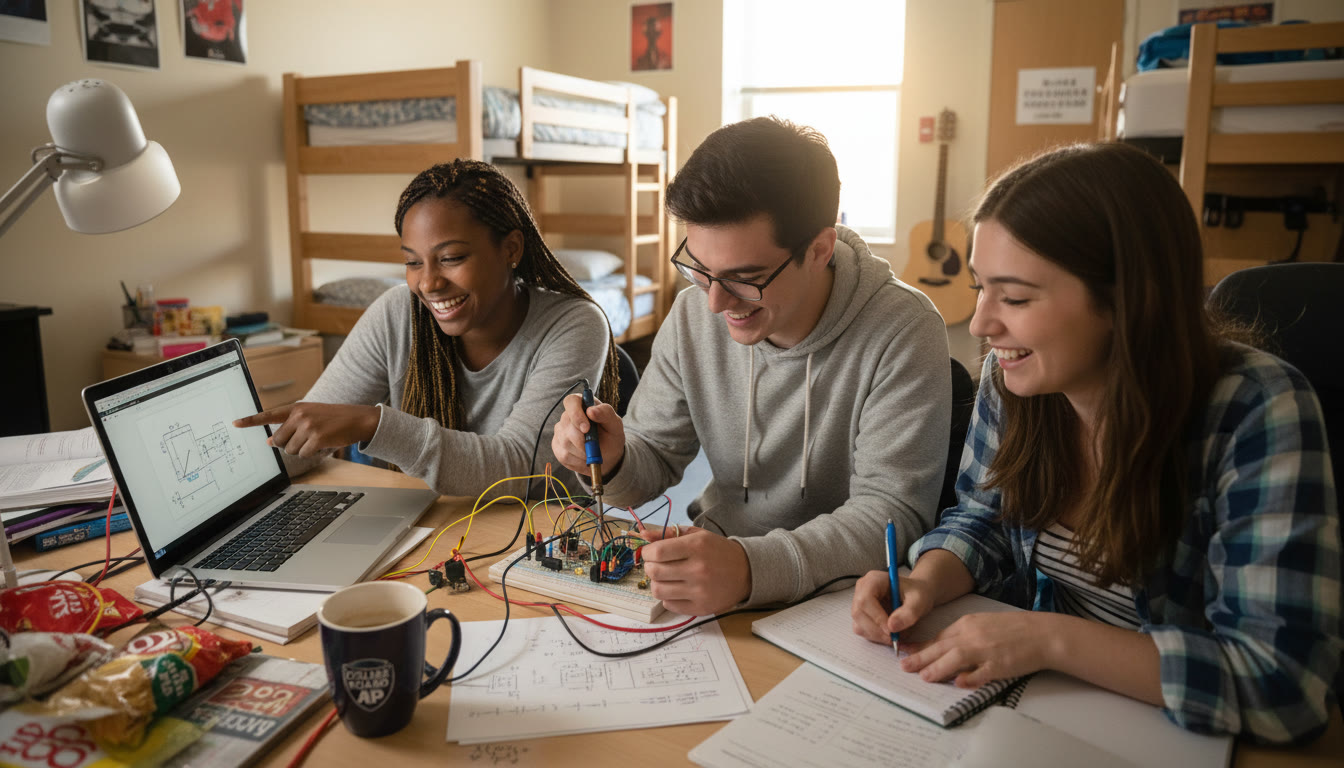Introduction — Why APs Matter for UC Irvine Engineering and ICS
Walking the college-admissions path with engineering or Informatics & Computer Science (ICS) in mind feels like preparing for a long, exciting relay race. Advanced Placement (AP) courses are one of those powerful legs in the relay — they can show admissions committees that you’re academically prepared and can give you a head start within your degree. For students aiming at UC Irvine, AP choices and scores can influence your admission profile, placement in first-year courses, and even how long it takes to graduate.
A personal note to students and parents
If you’re juggling schoolwork, extracurriculars, and the pressure to align everything with a future engineering or ICS major, breathe. This guide is written to be practical and encouraging: I’ll walk through which APs matter most, how to build a balanced plan, real-world examples of course sequencing, and smart ways to use tutoring and personalized study to make your application — and first-year experience — smoother and more successful.

Understanding UC Irvine’s Engineering and ICS Paths — What Admissions Look For
UC Irvine’s schools that offer strong engineering and ICS tracks expect applicants to have rigorous academic backgrounds, solid math and science preparation, and a record of intellectual curiosity. Admissions readers look for:
- Challenging coursework: APs in math, physics, and computer science demonstrate readiness.
- Strong grades in core STEM classes (Algebra II/Trig, Precalculus/Calculus, Chemistry, Physics).
- Evidence of applied interest: coding projects, robotics, internships, math competitions, research, or independent apps and websites.
- Well-rounded but focused extracurriculars showing leadership or depth.
APs help with both pieces: they signal rigor on your transcript and can translate into advanced placement or credit once you enroll—saving time and letting you dive into higher-level engineering and ICS courses sooner.
Which AP Exams Matter Most for Engineering and ICS
Not all APs are created equal when it comes to technical majors. Below is a practical prioritized list based on how useful each exam is for admission credibility and for placement at UCI.
Top-tier (Highly recommended)
- AP Calculus AB/BC — indispensable. Calculus is foundational to engineering and ICS; a strong score demonstrates quantitative maturity.
- AP Physics (1, 2, or C Mechanics/Electricity & Magnetism) — pick AP Physics C if you can (it’s calculus-based and most directly relevant to engineering), otherwise AP Physics 1 or 2 still shows preparedness.
- AP Computer Science A — shows real programming competency (Java is typical on the exam), critical for ICS applicants.
Very Useful
- AP Chemistry — important for certain engineering disciplines (chemical, materials) and signals lab experience and rigorous science training.
- AP Statistics — helpful for data-heavy ICS tracks and for understanding the basics of data analysis and probability.
Nice-to-have (adds depth)
- AP Biology — relevant for biomedical engineering tracks.
- AP English Language or Literature — strengthens the application by demonstrating communication skill, which engineering students often underestimate but need.
- AP Calculus BC extra topics or AP Computer Science Principles — broadens your profile if you cannot take the more technical APs.
How to Build a Two- to Three-Year AP Plan in High School
Think of AP sequencing as scaffolding: lay a strong math and science foundation early, then add specialization and depth. Below is a sample road map for students targeting UC Irvine engineering/ICS.
Sample AP Timeline
| Year | Focus | Recommended APs | Why |
|---|---|---|---|
| 10th Grade | Foundation | AP Biology or AP World History (if offered) | Build study habits; focus on GPA and foundational coursework (Algebra II / Precalculus). |
| 11th Grade | Math & Science Core | AP Calculus AB, AP Physics 1 or AP Chemistry | Shows readiness for technical majors; aligns with junior-year academic peak. |
| 12th Grade | Specialization & Depth | AP Calculus BC or BC topics, AP Physics C, AP Computer Science A | Signals mastery and prepares for college-level coursework and placement. |
Customize this plan for your strengths. If you’re a strong programmer from early on, swap one science AP for AP Computer Science A in junior year. The key is consistent rigor and not overloading at the expense of mastering the material.
AP Scores, Placement, and Credit — Practical Expectations
AP scores can help you place out of introductory courses or earn credit, but policies vary by campus and department. At UCI, many departments accept AP scores for placement or credit in calculus, physics, computer science, and chemistry. The benefit is twofold:
- You can avoid repeating introductory courses and move faster into major-specific classes.
- You have more flexibility to take elective topics, pursue research, or double-major/minor.
Realistically, strong AP scores (4–5) in Calculus and AP Computer Science A are especially impactful for placement in engineering and ICS. Even when AP credit is limited, the admissions value of those APs on your transcript is significant.
How APs Improve Your Application Narrative
Beyond scores, AP courses help tell a story: one of intentional preparation. Admissions officers read the transcript to see not just what you took, but how you challenged yourself relative to what your school offers. Consider these narrative-building approaches:
- Depth in a theme: A transcript filled with consecutive math and physics APs tells a different story than one with random APs across unrelated fields.
- Applied impact: Pair AP Coursework with projects — e.g., use AP Computer Science A knowledge to build a portfolio app, or apply physics concepts in robotics club competitions.
- Growth and resilience: If a challenging AP results in a lower grade but marked improvement later, briefly explain that learning curve in an essay or counselor note.
Study Strategies to Ace APs and Prepare for College-Level Work
AP exams require two things: content knowledge and test strategy. Here are high-yield tactics students can use in the year before exams.
Content and Learning
- Active problem practice: For calculus and physics, doing many varied problems is more valuable than rereading notes.
- Project-based reinforcement: Build projects (mini-programs, lab reports, small engineering mockups) to make abstract concepts concrete.
- Concept maps: Visually map how ideas connect — derivatives to motion, circuits to Ohm’s law, data structures to runtime complexity.
Exam Strategy
- Timed practice exams: Simulate testing conditions for MCQs and free-response sections.
- Answer structure: For free-response (especially in physics and CS), practice concise, stepwise solutions with units and justifications.
- Review cycles: Use spaced repetition for formulas, algorithms, and key experimental design principles.
Examples: Two Student Paths to UC Irvine Engineering/ICS
Concrete examples help make choices clearer. Below are two plausible student profiles and how AP choices support their admission and success.
Case A: Lina — Aspiring Mechanical Engineer
- APs taken: Calculus BC (5), Physics C: Mechanics (5), Chemistry (4), English Lang (4)
- Application benefits: Demonstrated high quantitative preparation and physics mastery; AP credit allowed Lina to take sophomore-level mechanics and a design elective in her first year.
- Outside class: Robotics team captain, summer engineering camp, community maker-space volunteer — these experiences complemented AP coursework on the application.
Case B: Mateo — Aspiring ICS/Data Science Student
- APs taken: Calculus AB (4), AP Computer Science A (5), AP Statistics (5), AP Physics 1 (4)
- Application benefits: Strong programming proof-of-skill, quantitative literacy through Calculus and Statistics; AP credits freed time to pursue undergraduate research in data systems.
- Outside class: Built mobile apps for local nonprofits and completed a data analysis internship, strengthening the ICS narrative.
How to Use Tutoring and Personalized Help Effectively
One-on-one guidance can be a game-changer when it’s targeted. Whether you work with a school teacher, peer tutor, or a service offering personalized tutoring like Sparkl’s, here’s how to get the most value from that support.
- Start with a diagnostic: Identify which AP topics need review and which are strengths.
- Create a tailored study plan: Break down content into weekly goals and include timed practice tests.
- Focus on active learning: Tutors should coach problem solving and exam strategies, not just lecture content.
- Use data-driven insights: Personalized programs that track progress and adapt practice (for example, by focusing on weak problem-types) save time and boost scores.
Sparkl’s personalized tutoring is mentioned here because well-structured 1-on-1 support often includes tailored study plans, expert tutors with subject-area depth, and AI-driven insights that help students sharpen weak spots quickly—especially in AP Calculus, AP Physics, and AP Computer Science A.
Planning for the First Year at UC Irvine
Once admitted, AP credit and placement decisions shape your first-year schedule. Many students use credit to:
- Skip redundant introductory courses and begin major core classes sooner.
- Add breadth courses or minors without overloading.
- Engage in undergraduate research or internships earlier in the degree.
Advising matters. Early contact with departmental advisors at UCI ensures you register for the best-fitting courses based on AP placements and your long-term goals.
Common Pitfalls and How to Avoid Them
- Taking too many APs at once: Depth often trumps quantity. Better to excel in three or four relevant APs than to underperform across eight.
- Choosing APs for resume appeal rather than interest or readiness: Admissions committees value sustained interest and mastery.
- Ignoring soft skills: Communication, teamwork, and problem-solving show up in essays and interviews — AP English or a writing-intensive course can help.
Checklist: Your Action Plan for a Strong UC Irvine Application
- By end of sophomore year: Aim to finish Precalculus; plan your AP timeline with counselor.
- Junior year: Prioritize AP Calculus and at least one AP science or AP Computer Science A.
- Senior year: Take one high-value AP that shows depth (Physics C, CS A, or Calculus BC topics) and complete project work that showcases applied skills.
- By applications time: Collect concise project descriptions, a portfolio link (if applicable), and teacher recommendations from STEM teachers who can speak to your technical strengths.
Final Thoughts — Your Journey, Not a Checklist
AP courses are powerful tools in your UC Irvine engineering or ICS toolbox, but they’re not the only parts of a compelling application. Admissions offices look for depth, curiosity, and evidence that you’ll thrive in a challenging academic environment. Use APs strategically to demonstrate those qualities, pair coursework with real projects, and get intentional support where you need it.
Personalized tutoring and tailored study plans—like those offered by Sparkl—can help you identify weaknesses early, keep your study efficient, and convert hard work into higher AP scores and stronger readiness for college-level work. Choose thoughtful rigor over frantic accumulation, show how your AP experiences led to real projects or growth, and remember: the path to UC Irvine is about steady planning, meaningful effort, and smart decisions that align with your talents and interests.
Parting encouragement for families
To parents: your support matters—encourage focus, but let curiosity lead. To students: keep building, experimenting, and asking questions. The best engineering and ICS applicants are not those who checked the most boxes, but those who followed their interests deeply and used APs to sharpen their skills.

Ready to make a plan? Start by mapping your next two years of courses, pick one signature project, and get a targeted diagnostics session (tutoring can help) to focus your preparation. You’ll be surprised how much progress consistent, well-directed effort can produce.
Closing line
UC Irvine’s engineering and ICS programs reward preparation, creativity, and grit. Use APs not as trophies but as tools — a way to learn deeply, show readiness, and enter college with momentum. Good luck — and enjoy the learning along the way.


















No Comments
Leave a comment Cancel